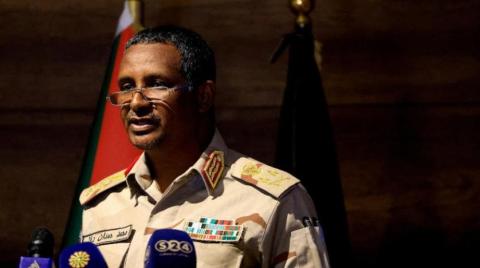
Last month, Lebanese Army Commander General Joseph Aoun, accompanied by the Director of Military Intelligence, Brigadier General Antoine Mansour, conducted separate visits to President Michel Aoun, Speaker Nabih Berri and Prime Minister Saad Hariri.
In the three visits, the two military officials entered with a black book of about 15 cm in thickness and left without it. The book represents, in fact, the summary of the security work of the Directorate of Army Intelligence and contains thousands of pages detailing terrorist networks that were stopped and dismantled during 2017.
The “black book” of terrorism in Lebanon is full of details and facts. Each cell is documented by the number of its members, its missions and objectives, the confessions of the detainees, their photographs, and often the pictures of the confiscated items, including weapons, military equipment and drugs.
Lebanese security sources confirmed to Asharq Al-Awsat that Lebanon has completely cut the roots of terrorism.
These figures only represent the work achieved by the military intelligence directorate, the sources said, emphasizing efforts undertaken by other partners in counter-terrorism operations, especially by the General Directorate of General Security and the Information Division of the Internal Security Forces.
The sources, however, admit the possibility of sporadic terrorist acts that might erupt here or there, but stress that the foundation that the terrorists used to rely on to acquire their weapons, explosives and logistical support, was hit hard by the country’s competent institutions.
“They will try, and we will remain vigilant to prevent any breach of Lebanese security,” the sources said.
“I can assure you that Lebanon is among the safest countries in the world today,” they added.
The Syrian refugee crisis has put great pressure on the Lebanese security, according to the sources, which expressed regret that more than 90 percent of detainees were of Syrian nationality, “which necessitates more work on this file.”
While the sources acknowledged that political stability was not a basic condition in the security process, they indicated that incitement should not be part of the political rhetoric, pointing out that the Lebanese Army and other security forces were able to control the situation, but politicians should also contribute to reducing the tensions between the Lebanese people.
The figures mentioned in the “Black Book” showed that ISIS was the “feared beast” at the media and psychological level, but Al-Nusra Front, led by Abu Malik al-Tali was the most dangerous, after it turned out that the organization was responsible for the majority of attacks and attempted attacks on the Lebanese territory.
The total number of detainees arrested in 2017 by the Lebanese intelligence reached 3,743, including 1,496 who were referred to the Judiciary.
The number of those involved in terrorism reached 943, in addition to 290 people who entered the country clandestinely from Syrian territory, while 22 were detained on terrorism financing charges and 59 on charges of possession of arms and ammunition.
The largest terrorist cell was caught on January 3, 2017. It included 11 people associated with Shadi al-Mulawi. The group planned to send car bombs to the suburbs of Beirut, targeting civilians and current and retired Lebanese army officers. Large amounts of explosives, explosive belts, detonators and remote weapons with ammunition, were seized during the operation.
On January 22, Omar Hassan al-Assi, a member of ISIS, was arrested while trying to carry out a suicide attack at Costa coffee shop in Hamra, Beirut.
On June 6, the army was able to carry out another significant operation, arresting Faisal Hussein Mamluk, who was involved in encircling army posts, storming the building of the Internal Security Forces in Arsal and engaging with his partners in the events of Arsal in 2013.
The next day, the army arrested Mohammed Badreddine al-Karnabi, an ISIS member, who participated in the battle of Arsal against the army and was charged with transferring suicide bombers and booby-trapped cars, in addition to other crimes.












